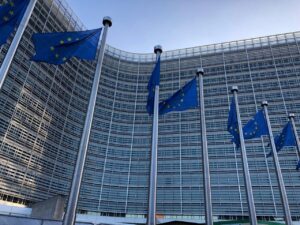Piotr Stępiński, editor of BiznesAlert.pl comments the appeal of Nord Stream 2 financial partners to ensure that it is not subordinated to EU law.
The presidents of the three companies cooperating with the Russian Gazprom on the construction of the Nord Stream 2 gas pipeline called on the European Commission to provide legal support in the face of the controversy that the project triggers among the EU Member States. – The law must be fully respected. Only in this way investment and energy security can be built – says a statement signed by President Wintershall, Mario Mehren, president of Uniper Klaus Schaefer and president of OMV Rainer Seele. – The legal basis for this project is unambiguous – managers think.
Change of the gas directive
The European Commission has a different opinion, it submitted a draft of the so-called gas directive in November last year. They are to indicate unambiguously that offshore gas pipelines from third countries that cross the territory of the European Union are subject to the regulations of the third energy package. The Russians criticize the plans for amending the directive, believing that if the purpose of the changes is to hit the company responsible for the implementation of the project, then it will demand compensation.
In addition, Brussels has asked Member States to provide a mandate for discussions on the legal basis for Nord Stream 2, which would be a consequence of the revision of the directive. Brussels wants to get a mandate from the Member States to negotiate on their behalf. The Russian side claims that the European Commission is seeking to block Nord Stream 2. The Commission declares that it only wants every bus from a third country in the Union to operate in accordance with EU law.
Accusations of Gazprom partners
The statement was published as part of the opposition to the new gas pipeline, mainly from outside Germany. At the same time, the German Green party criticized the planned investment, believing that taxpayers will incur high costs associated with connecting the bus to land gas pipelines. A growing dependence on natural gas was also criticized.
According to the presidents of Wintershall, Uniper and OMV, the discussion on the project takes place when Europe is increasing its demand for gas imports and LNG from the United States is too expensive. In their opinion, supplies of energy resources should not become a „pawn of the American energy, economy, security and geopolitics”.
In this context, it should be noted that LNG, among others from the United States, is an opportunity to reduce dependence on Russian fuel. Therefore, Moscow strives to promote the construction of the Nord Stream 2 gas pipeline and discredit the actions undertaken by the Central and Eastern European countries to diversify sources of supply, fearing the loss of its shares in this market.
Like Gazprom, representatives of these companies are trying to prove that Nord Stream 2 will provide a reliable gas supply route to consumers. – Countries such as Ukraine or Poland, acting as transit monopolists, are not interested in new and competitive gas infrastructure in Europe – we read in the document.
Nord Stream 2 is not a diversification
Previously, Poland has repeatedly emphasized the opposition to the construction of Nord Stream 2, noting the political nature of the project, which poses a threat to the security of the region. During the last visit to Berlin, Prime Minister Mateusz Morawiecki pointed out that this project does not serve to diversify sources of supply, because the fuel comes from the same source, but is supplied by another route. The launch of the project promoted by the Russians would deprive Ukraine of the role of the transit state and revenues amounting to approx. 3 percent of GDP. Kiev is on a long road of difficult and costly reforms. Depriving it of these funds and transit can lead to deepening the instability of our eastern neighbors.
Nord Stream 2
The first gas pipeline from Russia to Germany via the Baltic Sea – Nord Stream – was put into operation in 2012. Its capacity is 55 billion cubic meters annually. The same volume of gas will flow through Nord Stream 2. The planned gas pipeline may threaten the development of the market in the region and potential competition in the form of supplies from new, non-Russian sources. Its construction is to start in the summer of 2018 and allow the first delivery by the end of 2019.








